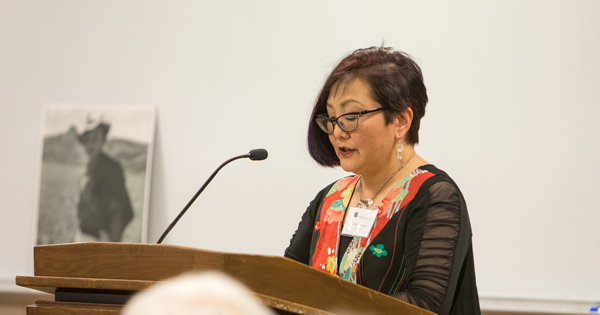


UDARF luncheon audience hears Distant Voices
Photo by Kathy F. Atkinson March 16, 2018
UD’s piano faculty accompanist Julie Nishimura performs
Hiroaki Nishimura kept a diary throughout his imprisonment in multiple Japanese internment camps in the United States during World War II. His daughter, Julie Nishimura, and her late husband Danny Peak created Distant Voices to bring her father’s words to life.
Julie Nishimura is a faculty accompanist and instructor for the University of Delaware’s department of music. Steven Gleich is the production manager for the Distant Voices Touring Theatre program. Together, they performed a shortened version of their show during a recent luncheon for the UD Association of Retired Faculty (UDARF) in Clayton Hall. Nishimura opened the show by talking about her fascination with her dad’s diary and how it inspired the performance.
“Danny suggested we use the diary as a basis for the presentation,” Nishimura said. “Danny transcribed sections of my dad’s diary and integrated it with articles from the newspapers, magazines, government documents and social features of the time. We then selected music we felt was appropriate to underscore and emphasize the emotion of each section. What emerged was a 75-minute performance.” For events such as the UDARF lunch, the group presents a shorter version that lasts about 30 minutes.
Nishimura took her place at the piano while Gleich organized his notes on a music stand at the front of the room. He performed all the speaking parts, which are normally divided between three people. A photo of Nishimura’s father was on the board behind them. Gleich began reading:
“April 29, 1942, Hiroaki says, ‘Today is finally coming. It has been very busy for three months since the evacuation order. From today now on I lose my given name and become number 14786. I carry only two suitcases.”
The audience heard a candid portrayal of Nishimura’s thoughts in the larger context of history as he was moved from camp to camp, eventually released and offered a redress check from the government years later. Despite Nishimura’s hardships, he still found small moments of joy, like when he reconnected with a friend after moving to another internment camp.
The performance closed with Gleich reading the words on a plaque placed outside the remains of an internment camp called Tulelake in California.
“Tulelake was one of 10 American concentration camps established during World War II to incarcerate 110,000 persons of Japanese ancestry — of whom the majority were American citizens,” Gleich said. “Behind barbed wire and guard towers without charge, trial, or establishment of guilt. These camps are reminders of how racism, economic and political exploitation and expedience can undermine the constitutional guarantees of United States citizens and aliens alike. May the injustices and humiliations suffered here, never occur.”
The group performed the show more than 250 times over the past 18 years, around the country, often at festivals and in schools. Nishimura said she is proud to share her father’s story and continue the work she started with her husband.
“My husband, who’s no longer here, I think he would be very happy that we’re continuing his work because he was very passionate about this,” Nishimura said. “This was his project from the get go. Yes, it was about my father, but it was really Danny’s work. It’s his work and we’re going to keep doing it.”
Contact Us
Have a UDaily story idea?
Contact us at ocm@udel.edu
Members of the press
Contact us at 302-831-NEWS or visit the Media Relations website

